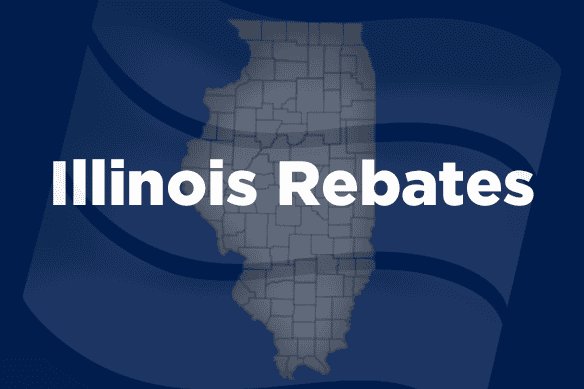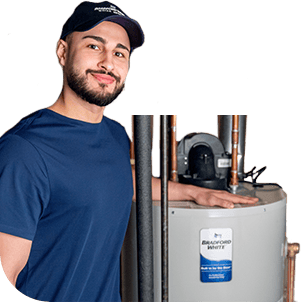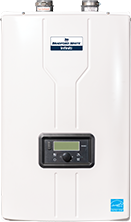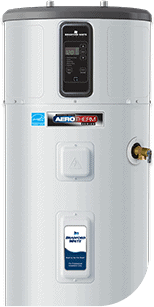Unlock Savings in the Prairie State: Your Guide to Illinois Water Heater Rebates

If you live in Illinois and want to lower your home’s energy costs, here’s some good news: by upgrading to a more efficient water heater (like an AeroTherm® Series G2 hybrid electric heat pump water heater from Bradford White), you could qualify for valuable rebates and incentives that can save you money!
To see how much you could save, we’ve created this guide for water heater rebates and incentives available to Illinois homeowners.
Upgrade to an Energy-Efficient Water Heater and Enjoy Benefits
In this article we’re focusing primarily on the rebates and incentives available to you, but there are many reasons to invest in a high-efficiency water heater now:
- Save Money Every Month: New, efficient models use less energy which can translate directly into lower monthly utility bills. The sooner you upgrade your water heater, the sooner you can lock-in those savings. Choosing a highly efficient water heater like an AeroTherm® Series G2 heat pump water heater will help you maximize those savings.
- Better Performance: If you’ve noticed your water isn’t always as hot as you’d like, it might be time to upgrade to a new unit that provides more consistent and reliable hot water. You might even consider upgrading to an efficient tankless water heater like Bradford White’s Infiniti Tankless® that provides an endless supply of hot water.
- Peace-of-Mind. If your water heater is older, you might want to think about replacing it. By upgrading now, on your own terms, you can schedule the upgrade for a time that is convenient for you and then have peace-of-mind knowing your new water heater will provide efficient performance for years to come.
- Increased Home Value: Energy-efficient upgrades can be an attractive selling point for a buyer if you decide to put your home on the market. You may even get a lot of your money back when you sell your home.
Where to Find Water Heater Rebates in Illinois
You can find a variety of rebate and incentive programs in Illinois, including programs from major utility providers and state-backed initiatives. Here’s a breakdown:
1. Programs Available through Utility Companies
Your local utility provider is often the first place to check for water heater rebates. For example:
- Peoples Gas offers $150 off a tankless water heater, and $150 off an indirect water heater (used with a boiler).
- Nicor Gas offers $150 off a tankless water heater along with other rebates.
How to Find Rebates from Your Utility: Visit your specific utility provider’s website and look for its “Energy Efficiency,” “Rebates,” or “Residential Programs” section. Be sure to note the eligible models, efficiency requirements (like UEF for Uniform Energy Factor), and application procedures.
Your plumbing contractor can help you navigate these rebates, and may even handle the paperwork for you. Need a plumbing contractor? Search here to find a Bradford White professional in your area.
2. Federal Tax Credits: The Energy Efficient Home Improvement Credit
Federal tax credits are important to mention. When you upgrade your home with energy-efficient improvements, including a more efficient water heater, federal tax credits may be available. For example:
- For a heat pump water heater you can claim 30% of the project up to a maximum $2,000 tax credit.*
- For a high-efficiency gas water heater (including tankless), you can claim 30% of the project up to a maximum $600 credit. *
These credits can directly reduce your federal income tax liability, which effectively helps you save on your water heater upgrade. Be sure to research the current federal guidelines and eligible models when making your purchase.
How to Claim: Keep all receipts and documentation from your purchase and installation. You’ll claim this credit when you file your federal income tax return using IRS Form 5695, Residential Energy Credits.
Important Note: This is a tax credit, not a deduction. It directly reduces the amount of tax you owe.
3. Illinois Home Weatherization Assistance Program (IHWAP)
The Illinois Home Weatherization Assistance Program (IHWAP) is designed to help low-income residents and households reduce energy costs by making their homes more energy efficient. This program can provide assistance with energy-related weatherization and repairs, which may include water heater repair or replacement as part of a broader home energy efficiency upgrade. Eligibility is based on household income.
How to Maximize Your Rebate Opportunities
To ensure you successfully claim your water heater rebates, keep these tips in mind:
- Check Eligibility Carefully: Every rebate program has specific requirements for efficiency ratings (e.g., UEF, ENERGY STAR® certification), tank size, and sometimes even the type of existing unit being replaced.
- Work with a Qualified Contractor: Many utility rebates require installation by a licensed professional. Your Bradford White professional can help you navigate these rebates and may even do the paperwork for you. Need a plumbing contractor? Search here to find a Bradford White professional in your area.
- Keep All Documentation: Save your sales receipts, installation invoices, product specifications, and any certification documents. These may be required for you to prove your eligibility to receive these rebates.
- Apply Promptly: Rebate programs often have application deadlines, usually within a certain number of days after purchase or installation. Make sure all your paperwork gets returned promptly.
- Check for Stacking Opportunities: In some cases, you might be able to combine a federal tax credit with a local utility rebate, which can help you maximize your total savings. Always check the specific program rules for “stacking” eligibility.
Upgrading your water heater is an investment in your home’s comfort and efficiency. With the various rebate programs available in Illinois, it’s never been a better time to consider a high-efficiency Bradford White water heater. Ready to upgrade? Bradford White can help guide you through the process, give you valuable information about your available options, and help you find a Bradford White professional in your area.
Federal rebates and incentives may be subject to change based on evolving government actions.
* The One Big Beautiful Bill Act will eliminate these tax credits beginning January 1, 2026.



